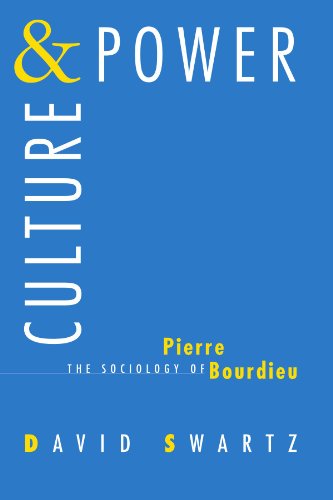Culture and Power: The Sociology of Pierre Bourdieu book
Par johnson heather le mercredi, décembre 2 2015, 20:31 - Lien permanent
Culture and Power: The Sociology of Pierre Bourdieu by David Swartz


Culture and Power: The Sociology of Pierre Bourdieu pdf free
Culture and Power: The Sociology of Pierre Bourdieu David Swartz ebook
Format: pdf
ISBN: 0226785955, 9780226785950
Publisher:
Page: 342
For example, Pierre Bourdieu (1984) has argued that objects which are considered to represent the highest achievements of culture (sometimes referred to as 'high culture') are merely those that have been given the stamp of approval by . Different from Marxist view of class, Pierre Bourdieu concerns the independent role of educational and cultural factors, especially, in modern society, the importance of formal educational institutions. For Bourdieu, cultural capital is regarded as the general cultural background, knowledge, experiences, disposition, and skills that are transmitted from one generation to the next [30, 40]. But social analysis can of course coexist with a commitment to social change, and it's not clear that the sociology of culture has done anything to undermine that commitment. Pierre Carles' documentary movie on his political work, Sociology Is a Martial Art, was a surprise commercial success in 2000-2001—portraying Bourdieu as a sort of intellectual equivalent of the farmer and anti-fast food activist José Bové. Cultural capital functions as power in particular institutional settings and are invested in 487–511, Oxford University Press, New York, NY, USA, 1977. Interview with Pierre Bourdieu. The French sociologist Pierre Bourdieu approaches power within the context of a comprehensive 'theory of society' which – like that of Foucault – we can't possibly do justice to here, or easily express in the form of applied methods (Navarro 2006 ). The solidarity of middle and working classes against oligarchic power may even be in better shape today than it was in 1993. Wacquant, “For a Socio-Analysis of Intellectuals: On Homo Academicus”. This isn't to say that Pierre Bourdieu and John Guillory are personally responsible for our predicament. I remember reading Guillory in as well as Bourdieu. Concept of symbolic power offered by French sociologist Pierre Bourdieu (1991). Swartz, Culture and Power: The Sociology of Pierre Bourdieu, University of Chicago Press, Chicago, Ill, USA, 1997. A second important concept introduced by Bourdieu is that of 'capital', which he extends beyond the notion of material assets to capital that may be social, cultural or symbolic (Bourdieu 1986: cited in Navarro 2006: 16). Evans, “Counter-Hegemony at Work: Resistance, Contradiction and Emergent Culture Inside a Worker-Occupied Hotel” M. Gleeson, “International Migration in Macro-Stratification Perspective: Bringing Power Back In.” . French sociologist PIerre Bourdieu, who besides coining the phrase "cultural capital" posited a theory of taste based on distinction and the power to consecrate aesthetic judgments of cultural products. Many noted they had alternate lives and fields of study: the sociologist who works with the Jewish community in London, the anthropologist who moonlights as a pianist for weddings, the classical musician who just started teaching a course in heavy metal—a . Unlike metal, academia is closely associated with what Pierre Bourdieu calls the “field of power”: the cultural capital it bequeaths is (still supposedly) convertible into economic and other forms of power.